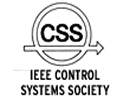Organization:IEEE Control Systems Society
This article relies too much on references to primary sources. (January 2020) (Learn how and when to remove this template message) |
 The original IEEE Control Systems Society Logo | |
| Formation | 1954 |
|---|---|
| Headquarters | New York City |
| Location | |
Official language | English |
| Website | www |
IEEE Control Systems Society (CSS) is an organizational unit of the IEEE. It was founded in 1954 and is dedicated to the advancement of the theory and practice of systems and control in engineering. Its focus is to promote scientific, technological, and educational advancements in the fields of automatic control, decision making, theory and applications, all over the world. Application areas include, and not limited to, aerospace systems, automotive systems, communication networks, cyber-physical systems, manufacturing, micro/nano systems, power grids, process control, robotics, smart communities, and systems and synthetic biology.
History
The history of the IEEE Control Systems Society goes back to one of the merged societies forming the IEEE: the Institute of Radio Engineers (IRE) organised the first meeting of the IRE Professional Group on Automatic Control on October 19, 1954.[1]
IEEE CSS Publications
- IEEE Control Systems Letters
- IEEE Control Systems Magazine
- IEEE Transactions on Automatic Control
- IEEE Transactions on Control Systems Technology
- IEEE Transactions on Control of Network Systems
- IEEE CSS State-Space
IEEE CSS Conferences
Financially Sponsored:
- IEEE Conference on Decision and Control
- IEEE Conference on Control Technology and Applications
- American Control Conference
IEEE CSS Technical Committees
- Aerospace Controls
- Automotive Control
- Control Education
- Discrete Event Systems
- Distributed Parameter Systems
- Healthcare and Medical Systems
- Hybrid Systems
- Intelligent Control
- Manufacturing Automation and Robotic Control
- Networks and Communication Systems
- Nonlinear Systems and Control
- Power Generation
- Process Control
- Robust and Complex Systems
- Security and Privacy
- Smart Cities
- Smart Grids
- Systems and Synthetic Biology
- Systems Identification and Adaptive Control
- Variable Structure and Sliding Mode Control
See also
References
External links
